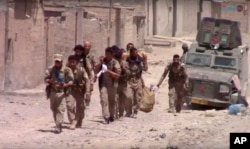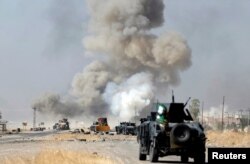The commander of coalition forces in Iraq said he hoped Islamic State leader Abu Bakr al-Baghdadi was "deader than a doornail," but he cautioned that regardless of whether the terror leader was alive or dead, the fight to reclaim all of Iraq from the group's grip was far from over.
"I don't have a clue," Lieutenant General Stephen Townsend told Pentagon reporters Tuesday when asked about Baghdadi's fate during a briefing from Baghdad. "Don't have a reason to believe he's alive. Don't have a reason to believe he's dead."
Townsend offered an additional thought: "If he is dead, that means someone's running ISIS and I think that they're trying to keep his death quiet for their own morale."
There has been a steady stream of reports regarding Baghdadi's death in recent weeks, including claims by the Russians, the Syrians and the Iranians.
Earlier Tuesday, the Britain-based Syrian Observatory for Human Rights said it had information confirming the death of the IS leader.
"We learned of it today but we do not know when he died or how," director Rami Abdel Rahman told AFP.
Baghdadi, 46, has not been since in public in 2014, when he appeared at Mosul's al-Nuri mosque and declared himself the caliph (leader) over IS-controlled land in Iraq and Syria.
Top U.S. military officials admit confirmation of Baghdadi's death could give the Iraqi military and other coalition-backed forces, like the Syrian Democratic Forces fighting to retake the IS-held city of Raqqa, a boost. But they also argue about the need to stay focused on finishing the fight against IS and its self-proclaimed caliphate, which is far from over.
Moving 'with all due speed'
"Mosul is certainly a significant accomplishment, but the rest of Ninewa province, to include the population center of Tal Afar, still has yet to be cleared," Townsend said. "Hawija has yet to be cleared. Western Anbar still has yet to be cleared.
"The Iraqi security forces and the coalition have a plan to get after them, and we'll move with all due speed," he added, refusing to estimate how much longer that might take.
Townsend also said he did not anticipate any changes to U.S. troop levels in Iraq for now, and he expressed confidence the U.S., Iraq and other members coalition were nearing a deal to ensure a continued presence on the ground even after all areas of the country were reclaimed from IS.
U.S. officials estimate that as many as a couple thousand IS fighters remain entrenched across the group's remaining strongholds in Iraq. And in at least some of those spaces, IS fighters retain the ability to come and go in small groups, especially in Anbar province.
Several thousand more are thought to be in Syria, where resistance has been stiffening despite advances of coalition partner forces, especially around Raqqa.
Even in Mosul itself, where Iraqi Prime Minister Haider al-Abadi formally declared victory on Monday, the fighting is not yet over.
The coalition says it most likely will take weeks to root out as many as a couple hundred IS fighters, including some thought to be linked to plots to attack the West, still holed up in Mosul's Old City. And despite some offers by the remaining IS commanders to surrender to Iraqi forces, there are doubts they will give up so easily.
According to the coalition, at least one such offer to surrender was nothing more than a failed ploy by IS to get its suicide bombers closer to Iraqi military personnel.
There also is much work to be done to clear improvised explosive devices and other booby traps left behind by IS, a process that officials describe as painstaking and dangerous.
The coalition says that despite dwindling numbers, IS fighters largely have chosen to confront the Iraqi military and coalition-backed forces in Syria not as insurgents but as a conventional standing military, something that has played to the coalition's strengths.
More wreckage
The strategy, however, also has led to increased destruction, especially in Mosul, where coalition officials estimate about one-quarter of the city sustained heavy damage.
Additionally, there have been accusations from human rights groups that coalition efforts were, at times, unlawful.
Human rights group Amnesty International released a report Tuesday detailing the loss of civilian life in the battle for Mosul, documenting at least 400 civilian deaths just in west Mosul between January and mid-May.
"The scale and gravity of the loss of civilian lives during the military operation to retake Mosul must immediately be publicly acknowledged at the highest levels of government in Iraq and states that are part of the U.S.-led coalition," said Lynn Maalouf, director of research for the Middle East at Amnesty International.
Townsend, the coalition commander, admitted there had been civilian casualties but blamed IS, which he said endangered civilians and slaughtered them as they tried to flee.
"I reject any notion that coalition fires were in any way imprecise, unlawful or excessively targeted civilians," he said, describing the fighting in west Mosul as the "most extended and brutal combat I have ever witnessed," praising Iraqi forces for making "extraordinary efforts to safeguard civilian lives, even at the cost of their own."
VOA's Victor Beattie and Heather Murdock contributed to this report.






